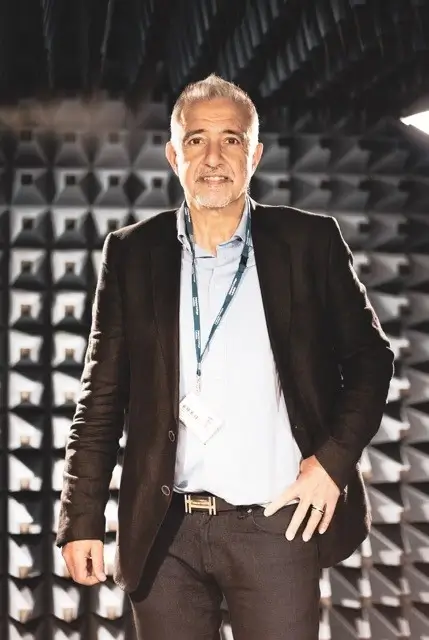DNAe co-founder Professor Chris Toumazou named first ever UK winner of the UNESCO-Equatorial Guinea International Prize for Research in the Life Sciences
DNAe’s co-founder honoured by international jury for transformative biomedical engineering and diagnostic innovations
London, United Kingdom – 15 March 2022 – DNAe co-founder Professor Christofer Toumazou has been officially announced as a laureate of the 2021 UNESCO-Equatorial Guinea International Prize for Research in the Life Sciences – the first UK winner. Professor Toumazou has been recognised by a distinguished international jury panel for his innovations in bio-inspired technology and personalised medicine that have revolutionised healthcare and pushed the boundaries of biomedical engineering, including the semiconductor sequencing technology that powers DNAe’s pioneering end-to-end sequencing system. The honour was conferred upon Professor Toumazou at a special prize-giving ceremony at UNESCO’s headquarters in Paris on March 14th 2022 by the Prime Minister of the Republic of Equatorial Guinea and the Deputy Director General of UNESCO.
Professor Chris Toumazou is a pioneer of revolutionary near-patient diagnostic systems that are improving quality of life for people across the world. His innovations are driving advances in personalised healthcare, early detection and active prevention of disease, including sepsis, heart disease, obesity and diabetes – to deliver life-saving impacts.
This prestigious UNESCO-Equatorial Guinea International Prize rewards significant efforts of individuals or institutions through scientific research towards improving the quality of human life, and is awarded annually to a maximum of three laureates. The Prize was established by UNESCO’s Executive Board in 2012, to support the achievement 2030 Agenda for Sustainable Development as well as UNESCO’s global priorities to encourage research, enhance collaboration amongst researchers and reinforce networks of centres of excellence in the life sciences.
Commenting on his honour, Regius Professor Chris Toumazou said: “I am deeply honoured and humbled to be named the first ever UK winner of the UNESCO-Equatorial Guinea International Prize for Research in the Life Sciences. My life’s work has been dedicated to democratising healthcare and bringing the economies of scale of the semiconductor industry to diagnostics and treatment, particularly in the areas of early detection, diagnosis and prevention. The vision that drives my research is that, one day, healthcare will be truly personalised, and that health professionals everywhere will look not just at your medical history, but also your medical future. I extend my heartfelt thanks to the UNESCO-Equatorial Guinea International Prize jury for this incredible honour.”
Professor Toumazou’s career has long been distinguished for his ground-breaking research in bringing silicon technology to the field of medical devices for early detection, diagnosis and therapy. His co-invention of semiconductor-based genomics has transformed how clinicians detect and treat conditions – from cancer to bacterial and viral illness. Through DNAe, this technology is poised to deliver fast and accurate diagnosis of blood stream infections and antimicrobial resistance in near patient settings, enabling early, targeted intervention crucial to preventing death from serious bloodstream infections leading to sepsis.
Professor Chris Toumazou holds the 2014 European Patent Office European Inventor Award, the Royal Society Gabor Medal and the prestigious IET Faraday Medal for his pioneering work in the field of microchips for healthcare and the co-invention of semiconductor genetics.

– ENDS –
Contact Details
DNAe
Samuel Reed, President, DNAe Group
Please contact me via Instinctif (see below)
Instinctif Partners (media relations)
Tel: +44 (0) 20 7457 2040
Tim Watson / Katie Duffell / Grace Rutter
Email: DNAe@instinctif.com
About Professor Chris Toumazou FRS, FREng, FMEDSci, NAE, FIET, FIEEE, FCGI, FRSM, CEng, DEng, PhD, BSc
Regius Professor of Engineering, Chair in Biomedical Circuit Design, Director of the Centre for Bio-Inspired Technology and Founder and Chief Scientist for the Institute of Biomedical Engineering at Imperial College London
Co-founder & CEO, DnaNudge
Co-founder & Executive Chairman, DNAElectronics
Professor Toumazou is Regius Professor of Engineering, Chair in Biomedical Circuit Design,
Director of the Centre for Bio-Inspired Technology and Founder and Chief Scientist for the Institute of Biomedical Engineering at Imperial College London. His co-invention of semiconductor DNA sequencing revolutionised genetic testing and, in recognition of this and several other major healthcare innovations, he has been honoured with the prestigious European Patent Office European Inventor Award, The Royal Society Gabor Medal, and the illustrious IET Faraday Medal.
He is the co-founder of two successful medical device companies – DNA Electronics (DNAe) and DnaNudge. With DNAe, Professor Toumazou has pioneered rapid near-patient diagnostics.
About DNAe – www.dnae.com
DNAe is commercializing its pioneering semiconductor sequencing technology for healthcare applications where rapid point-of-need diagnostics are of critical need, including infectious disease and cancer testing and monitoring. It is developing LiDia-SEQ™, a user-friendly, direct-from-specimen platform that performs genomic analysis ona microchip, to provide actionable information to clinicians.
DNAe’s initial focus is on infectious disease diagnostics, where speed and DNA-specific information can make the difference between life and death. This includes a range of tests, starting with a groundbreaking test for bloodstream infections (BSI) and antimicrobial resistance (AMR), which uses whole blood specimens to detect and identify infections that lead to sepsis. This will provide clinicians with actionable information to help select the appropriate antibiotics to treat the disease. A pipeline of follow-on tests is in development for viruses and cancer testing and monitoring.
The Biomedical Advanced Research and Development Authority (BARDA), a division of the Assistant Secretary for Preparedness and Response (ASPR) in the U.S. Department of Health and Human Services (HHS),awarded DNAe a contract worth up to $51.9 million, if all options are awarded, to develop its diagnostic platform, initially for antimicrobial-resistant infections.
A private company, with facilities in London, UK and Carlsbad, CA, USA, DNAe’s major shareholder is Genting Berhad, a Malaysian-based global investor with a growing portfolio of investments in cutting-edge life sciences companies.


